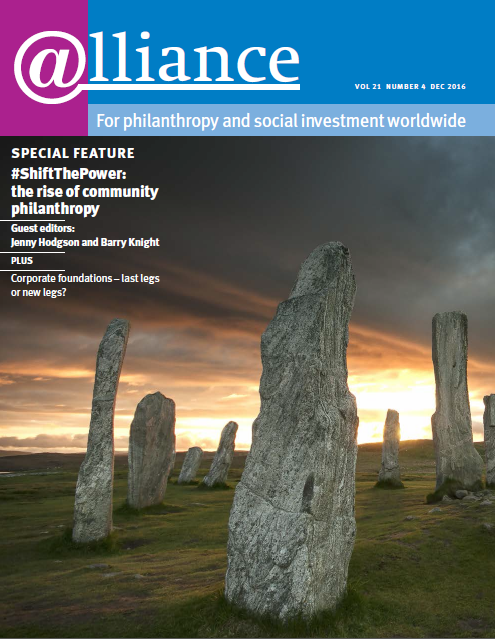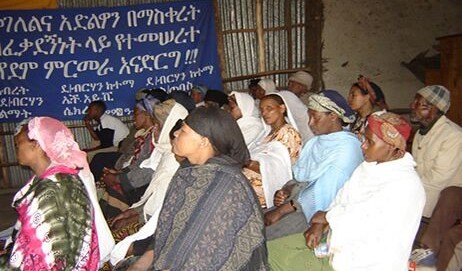Earlier this year I met a group of collaborators who are all working on and for a community philanthropy model. When they described to me what they were doing I got really excited. Why? Well, for starters, I was schooled in the core principles of community-driven development right at the start of my career, and have held these values dear ever since. It was these values that led me to Comic Relief, as I saw in its grantmaking a deep commitment to ensuring that community and the people who live with poverty and injustice should be setting priorities.
A further reason for my excitement is that it is a very different resource mobilization model. The idea is that community members pool some of their own resources, however small, in a community-managed fund, then other investors also contribute to the pot. This approach has the potential to do a number of positive things.

In Uganda, a community celebrates the completion of a clinic that received funding from Comic Relief.
First, to generate local domestic resources and reduce dependency on external funds, devolving power and getting resources closer to the ground – putting fuel in the tank of locally-driven development. Second, to really deepen community engagement and ownership of decisions on development interventions and investments. There is nothing like having your own cash to ensure you take an active interest in how it is used.
First, we are usually the stewards of other people’s funds, so we need to strike the right balance between accountability to our own supporters and empowering communities to make their own decisions and manage their/our funds.
And the final dimension of this model I found really exciting is the way in which it can spur organizational development. Community organizations responsible for managing collective funds need to rapidly develop ways of working that instil confidence and provide the right level of accountability. They also need to keep conversations within the community strong and ensure that those involved in decision-making over funds are listening to the priorities of the quieter and more marginalized voices.
So, are donors like Comic Relief who are keen to support locally-driven development processes willing to put our own resources into pooled funds managed and governed by the communities we aim to help? I think we should be. Comic Relief has made ‘strengthening communities’ one of its four core pillars. We have tried a number of different models of grantmaking over the years in order to get our funds as close to the ground as possible. Here in the UK, for instance, the UK Community Foundations scheme has been running since 2005, providing small grants of about £10,000 to grassroots organizations.
However, funders need to keep some important considerations in mind. First, we are usually the stewards of other people’s funds, so we need to strike the right balance between accountability to our own supporters and empowering communities to make their own decisions and manage their/our funds. What is needed in our experience is deep and context-specific scrutiny of potential grantees; appropriate due diligence for the level of funding; a strong relationship and good communication between the funder and community organization (which includes genuine respect for the investment of time and funds by community members themselves); an adaptability in terms of plans and monitoring/learning; and a commitment to invest not only in the specified outcomes of the project but in strengthening the community organization.
There is nothing like having your own cash to ensure you take an active interest in how it is used.
As funders, we need to tread carefully and not rush to invest too fast or too much, as the wrong balance between external investment and community resources, and between expansion and organizational development, could upset the fragile symmetry of community philanthropy.
Despite these challenges, I am still excited to see what communities can achieve through this model. It won’t work everywhere. It requires time, capacity and crucially some financial investment (however minimal) by community members. In some contexts even these are a luxury. However, I feel it does have huge potential to challenge us all – both local and international donors, and community groups – to ‘put our money where our mouth is’ and to co-invest. Surely together we are stronger.
Jennie Richmond is head of international grants at Comic Relief. Email j.richmond@comicrelief.com







Comments (0)